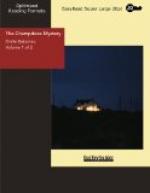“Do not utter a word more, Count,” said he; “I forbid you to do so.”
He spoke so disrespectfully that Octave was about to strike him, but Montlouis drew back and avoided the blow; but he was so intoxicated with fury that this last insult roused him beyond all bounds.
“By what right do you speak thus,” said he, “who have married another man’s mistress? It well becomes you to talk of woman’s virtue, when your wife is a—”
He had no time to finish his sentence, for Octave, levelling his gun, shot him through the heart.
M. de Mussidan kept these facts from his wife because he really loved her, and true love is capable of any extreme; and he felt that, however strong the cause might be, he should never have the courage to separate from Diana; that whatever she might do in the future, or had already done in the past, he could not choose but forgive her.
Acquitted of all blame, thanks to Clinchain’s and Ludovic’s evidence—for they had mutually agreed that the tragical occurrence should be represented to have been the result of an accident—the conscience of M. de Mussidan left him but little peace. The girl whom Montlouis had loved had been driven from her home in disgrace, owing to having given birth to a son. Octave sought her out, and, without giving any reason for his generosity, told her that her son, whom she had named Paul, after his father, Montlouis, should never come to want.
Shortly after this sad occurrence, M. de Mussidan and his wife quitted Poitiers, for Diana had more than once determined that she would make Paris her residence for the future. She had taken into her service a woman who had been in the service of Marie de Puymandour, and through her had discovered that, previous to her marriage with Norbert, Marie had loved George de Croisenois; and she intended to use this knowledge at some future date as a weapon with which to deal the Duke de Champdoce a deadly blow.
CHAPTER XIII.
A scheme of vengeance.
The marriage between Norbert and Mademoiselle de Puymandour was entirely deficient in that brief, ephemeral light that shines over the honeymoon. The icy wall that stood between them became each day stronger and taller. There was no one to smooth away inequalities, no one to exercise a kindly influence over two characters, both haughty and determined. After his father’s death, when Norbert announced his intention of residing in Paris, M. de Puymandour highly approved of this resolution, for he fancied that if he were to remain alone in the country, he could to a certain extent take the place and position of the late Duke, and, with the permission of his son-in-law, at once take up his residence at Champdoce.




